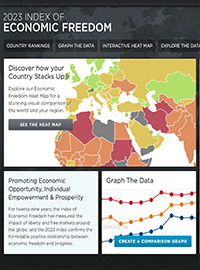| U.S. Score Falls to All-Time Low in 2023 Index of Economic Freedom |
 |
|
By Timothy H. Lee
Thursday, May 11 2023 |
Economic freedom, which includes physical and intellectual property rights, made the United States the wealthiest, most innovative and most powerful nation in the history of the world. Accordingly, when America’s economic freedom score falls to an all-time low in the latest Heritage Foundation Index of Economic Freedom just as recession worries rise, it’s cause for alarm. Unfortunately, that’s precisely what this year’s Index reveals: The United States ranking holds steady at No. 25 with an overall economic freedom score of 70.6, which is its lowest score ever, and the third-highest ranking in the American region. The U.S. received a “mostly free” rating, the same as its 2022 rating, despite dropping 1.5 points from 72.1. Each year since 1995, the Index measures the world’s nations on a scale of 0 to 100 in 12 quantitative factors, grouped into four broader pillars of economic freedom: (1) Rule of Law (which includes property rights, government integrity and judicial effectiveness), (2) Government Size (which includes government spending, tax burdens and fiscal health), (3) Regulatory Efficiency (which includes business freedom, labor freedom and monetary freedom) and (4) Open Markets (which includes trade freedom, investment freedom and financial freedom). On the basis of those scores, nations are categorized into one of five categories: (1) Free, (2) Mostly Free, (3) Moderately Free, (4) Mostly Unfree and (5) Repressed. In turn, the Index statistically correlates nations’ economic freedom with their prosperity and overall wellbeing: Economic freedom brings greater prosperity. The Index of Economic Freedom documents the positive relationship between economic freedom and a variety of positive social and economic goals. The ideals of economic freedom are strongly associated with healthier societies, cleaner environments, greater per capita wealth, human development, democracy, and poverty elimination. Illustrating that correlation in objective numbers, nations in the “Free” category boast average incomes of $92.502, while “Mostly Free” nations stand at $52,663, “Moderately Free” nations at $26,289, “Mostly Unfree” countries at just $11,684 and “Repressed” nations merely $8,124. That direct relationship between freedom and income is clear and undeniable. In this year’s Index, only four nations now qualify as “Free”: (1) Singapore, (2) Switzerland, (3) Ireland and (4) Taiwan. Distressingly, the United States now stands just three spots above the middling “Moderately Free” category. It’s also worth noting that we stand nine slots below Canada at sixteenth, while the “socialist” Scandinavian nations of Denmark, Sweden, Finland and Norway place well above us at ninth, tenth, eleventh and twelfth, respectively. Additionally, although “holding steady at No. 25” in this year’s Index provides a deceptive sense of stability, keep in mind that we stood at twelfth in the 2019 Index after plummeting from sixth to eighteenth during the Obama Administration: America’s economic freedom has seen a dramatic boost – from 18th place in the world to 12th place in the span of just one year. America’s score ticked up by more than a full point from last year, reaching the highest level in eight years. The vibrant growth we’re feeling has been unleashed by several key policy changes over the past two years, the most important being the 2017 tax cuts and deregulation. Real gross domestic product grew by upward of 3 percent over the last four quarters – unlike anything seen in the last 13 years. Even more troubling, when the first Index was published in 1995, the U.S. ranked fourth. On the bright side, however, our rapid reascent between the Obama years and the Covid pandemic illustrates that our downward trajectory can be reversed. To accomplish that improvement, however, we obviously must identify the cause of our recent decline. On that front, Heritage research fellow EJ Antoni was unequivocal. “For months,” he says, “the Biden Administration has ignored warnings of wasteful spending and poor economic policies, and the American people are the ones paying for it.” Antoni added that, “Consumers are depleting their savings, which dropped over $1.6 trillion in 2022, and incurring more credit card debt just to provide for their families.” Antoni concludes, “Our economy is running on fumes, and the last thing America needs is more taxing, spending and regulation by the federal government.” Fortunately, Americans seem to understand that reality. Specifically, according to a new Gallup survey released last week, Americans identify the government as the most important problem facing the nation today, even ahead of the economy, inflation and immigration. Accordingly, we seem to understand that big government is what ails us, and that lower taxes, less spending and lighter regulation offer the road to recovery. Now it’s just a matter of acting upon it and correcting our troubling course. |
Related Articles : |
























